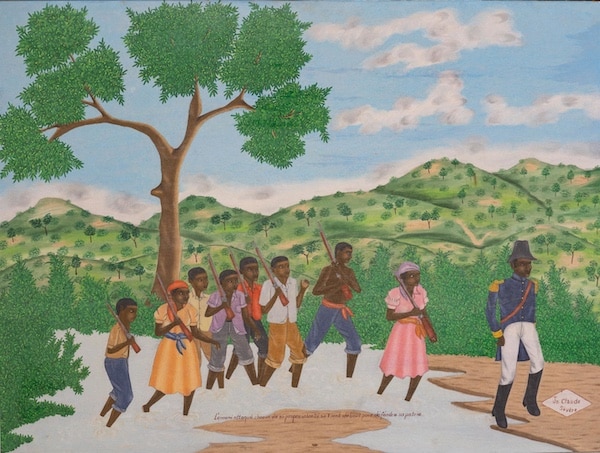Dear Friends,
Greetings from the desk of Tricontinental: Institute for Social Research.
On a stormy August night in 1791, Dutty Boukman (1767—1791) and Cécile Fatiman (1771—1883) conducted a Vodou ceremony at Bois Caïman in northern Saint-Domingue, in the French-owned part of Hispaniola. Boukman was captured in Senegambia (now Senegal and The Gambia), and Fatiman was the daughter of a woman from the Congo (as Aimé Césaire wrote) and a man from Corsica. Their ceremony amidst over two hundred enslaved Africans was the catalyst for a mass uprising across the French plantations. Boukman, in Kreyòl, spoke words that were passed down through memory for generations and eventually entered the history books (including C. L. R. James’s 1938 classic The Black Jacobins):
The god who created the sun which gives us light, who rouses the waves and rules the storm, though hidden in the clouds, he watches us. He sees all that the white man does. The god of the white man inspires him with crime, but our god calls upon us to do good works. He will direct our arms and aid us. Throw away the symbol of the god of the whites who has so often caused us to weep, and listen to the voice of liberty, which speaks in the heart of us all.
The resonance of the 1789 French Revolution lingered at the edges of the ceremony convened by Boukman and Fatiman. But even more powerful for them were their own traditions of humanity, drawn from a range of African and Islamic beliefs, both of which were part of their heritage. The enslaved Africans rose up. They burnt the plantations and killed those who claimed to own them. Their revenge was brutal, but then it could not even begin to mirror the treatment that had been forced upon them. For a taste of the plantation owners’ attitude, one has only to read these musings of how best to use an enslaved African—recounted by an English plantation owner in Antigua to Captain John Newton, a trader of enslaved Africans turned abolitionist—who recorded this and other examples in his 1787 pamphlet Thoughts Upon the African Slave Trade:
Whether, to appoint them moderate work, plenty of provision, and such treatment, as might enable them to protract their lives to old age? Or, by rigorously straining their strength to the utmost, with little relaxation, hard fare, and hard usage, to wear them out before they became useless, and unable to do service; and then, to buy new ones, to fill up their places?
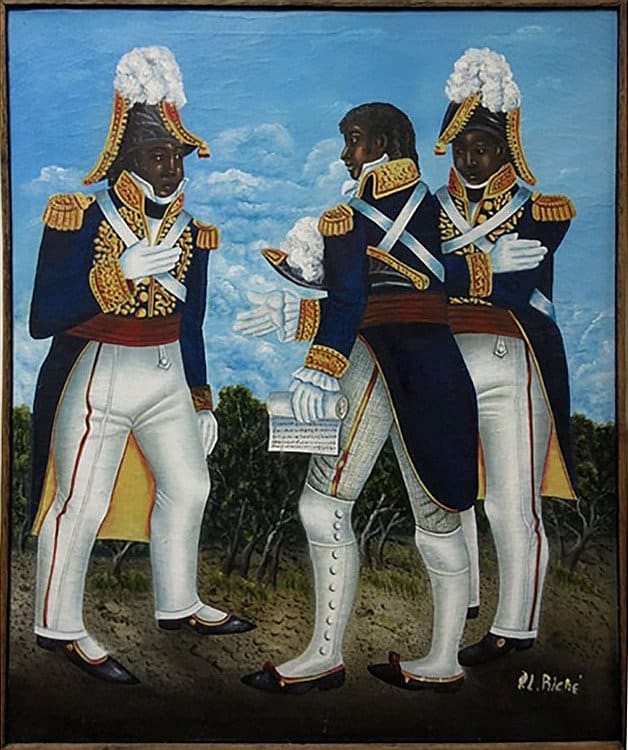
Pierre-Louis Riche (Haiti), The Handshake and Hopeful Suitors, n. d.
That night began the rebellion that would eventually be led by Toussaint L’Ouverture (1743—1803). By 1791, L’Ouverture, who had been taught to read by his godfather, was the steward of a plantation (a post that afforded him access to many books, including Julius Caesar’s Commentaries on the Gallic Wars, which introduced him to military science). L’Ouverture and the other rebel leaders briefly allied with the Spanish to defeat the French, who then turned to the British for support—the Europeans would have to set aside their own animosities to bury the true threat to themselves: the rebellion of enslaved Africans. The balance would further shift with the rise of the Jacobins in Paris, led by Maximilien Robespierre. In February 1794, Robespierre and the Jacobins supported a National Convention decree to end slavery in the French colonies, prompting an alliance between the French army and L’Ouverture’s forces against the Spanish and the British. Aux armes, citoyens! (To arms, citizens!), the formerly enslaved Africans would sing in Kreyòl behind L’Ouverture.
Robespierre was eventually overthrown. In 1799 Napoleon Bonaparte came to power as First Consul and broke all agreements between the French and the African revolutionary forces, including the decree to end slavery. From 1802 to 1803, France’s Viscount of Rochambeau led a reign of terror in the northern region of Saint-Domingue to restore French control of the colony; his methods included using 1,500 Cuban mastiffs to hunt down the Africans and reportedly burning sulphur in the holds of ships to suffocate rebel prisoners. Rochambeau would tell the French soldiers, ‘It is no longer bravery I want from you. It is rage’. They threw so many bodies into the waters near Le Cap (now Cap-Haïtien) that, for a long time, people refused to eat fish that was caught there. L’Ouverture was arrested by the French in 1802 and died the following year in a prison in the Jura Mountains, near the Swiss border. However, his army—now under the command of Jean-Jacques Dessalines—continued to fight. On New Year’s Day in 1804, Dessalines’ forces declared independence from France and renamed their country Hayti (now Haiti, the Taíno word for ‘land of mountains’).
The people of Haiti conducted the first successful revolution of the Third World. During the last months of the fighting, Dessalines asked his goddaughter, Catherine Flon, to remove the white section from the French flag, sew the red and blue together, and inscribe on their flag of independence La liberté ou la mort(Freedom or death). When they won their freedom, the words came off the flag.
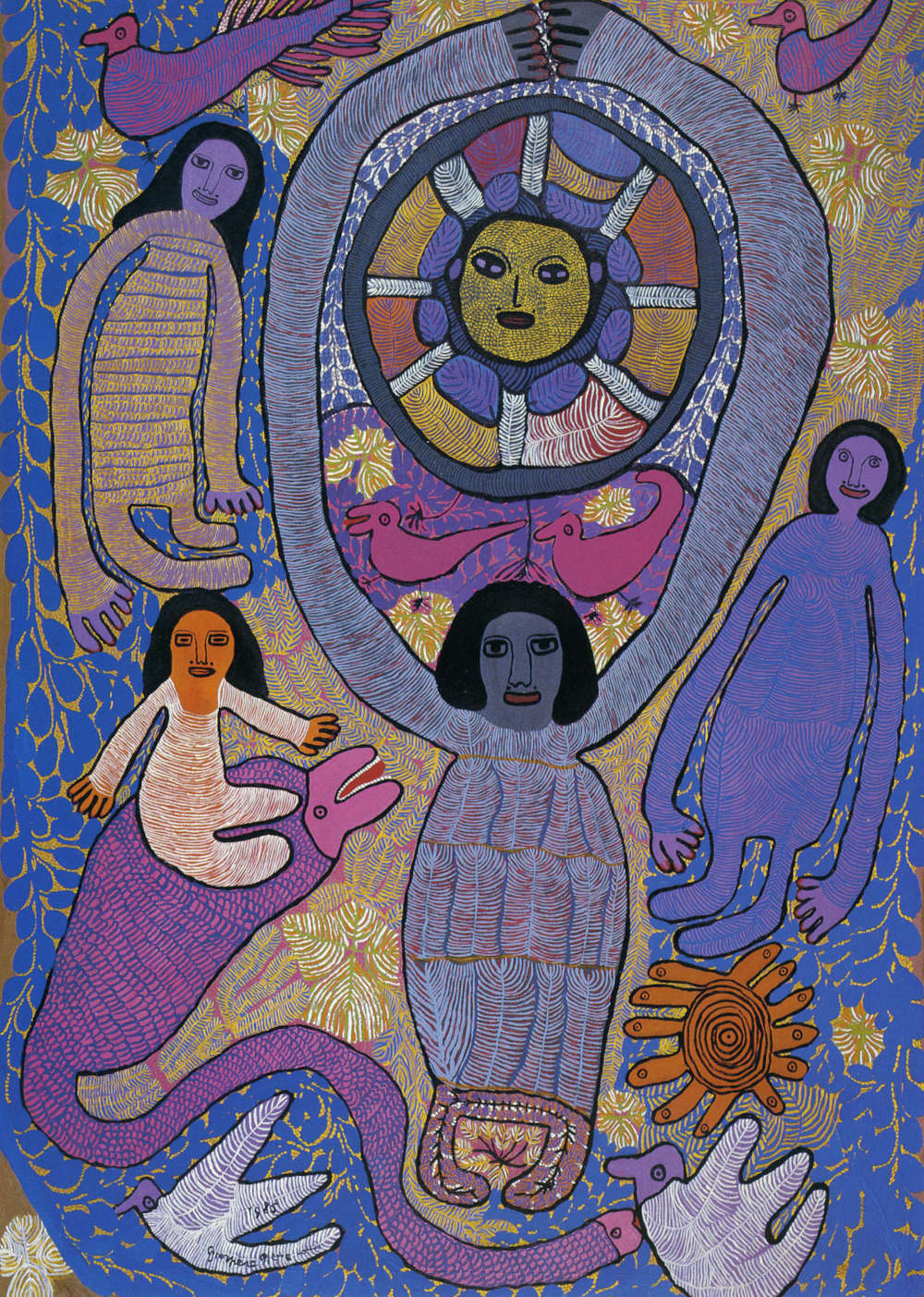
Prosper Pierre-Louis (Haiti), Genesis, 1985.
But freedom is not so easy to attain.
The newly created United States, built on the foundations of slavery, feared that the Haitian Revolution might spread to its own soil. In 1792, U.S. President George Washington instructed his Secretary of State Thomas Jefferson to send three quarters of a million dollars in aid to help the plantation owners suppress the revolts. In July 1802, Thomas Jefferson, by then president of the United States, wrote to Britain’s ambassador to the U.S., Rufus King, ‘The course of things in the neighbouring islands of the West Indies appears to have given a considerable impulse to the minds of the slaves in different parts of the U.S. A great disposition to insurgency has manifested itself among them’. That is why Jefferson and his cabinet set out to find any means to smother the Haitian Revolution. On 21 February 1806, Jefferson banned trade with ‘certain parts of the island of St. Domingo’, namely Haiti. In 1824, South Carolina Senator Robert Hayne put it bluntly: ‘Our policy with regard to Hayti is plain. We never can acknowledge her independence. The peace and safety of a large part of our Union forbids us even to discuss it’. Haiti’s freedom was a challenge to U.S. slavery.
In 1825, in an act of gunboat diplomacy, France’s King Charles X sent a fleet of warships to Haitian waters and demanded that that the young nation pay 150 million francs as ‘compensation’ for the loss of its colony and enslaved labour force. The sum was ten times Haiti’s annual budget and equivalent to the amount the U.S. had paid for the Louisiana territory. Haiti borrowed from French banks to pay the money and then fell into a debt trap that it has never been able to exit. From 1825 to 1947, when Haiti finally paid off the debt, eighty percent of its wealth—around $21 billion—had been used as payment, leaving it in a state of total chaos (it is estimated that the Haitians ended up paying more than twice the value of the indemnity). This is an odious payment. Neither France nor Citibank, which bought the debt, have ever apologised for this plunder.
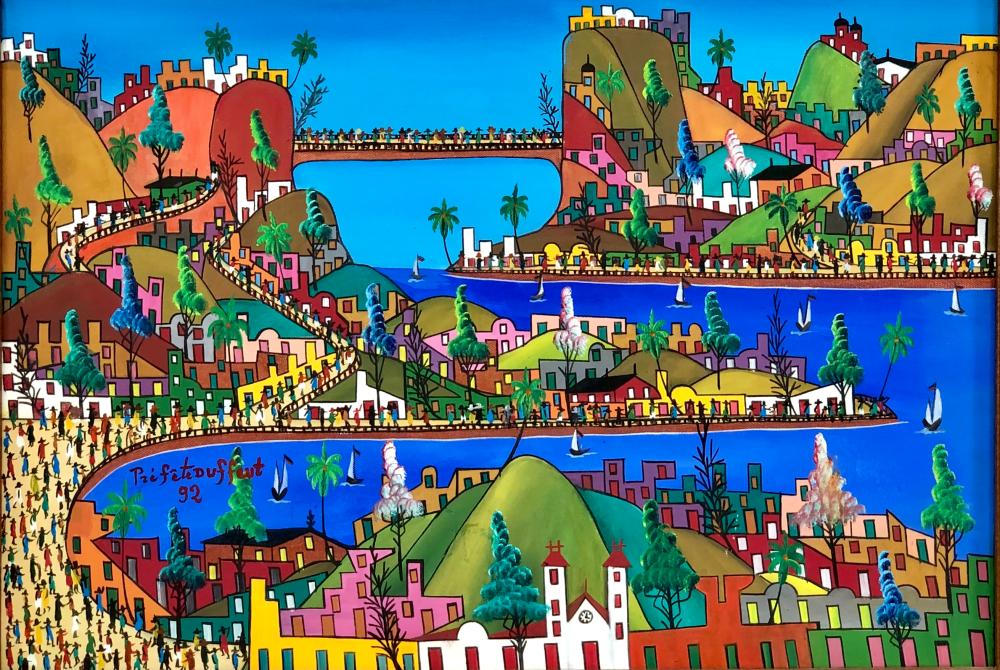
Prefete Duffaut (Haiti), Ville imaginaire (Imaginary City), 1994.
Every time Haiti has tried to stand up, it has been pushed down.
In 1915, when Haiti’s new government tried to carve out its sovereignty after the assassination of U.S.-friendly President Jean Vilbrun Guillaume Sam, the United States armed forces intervened—occupying the island for nineteen years until 1934—and then put in place the brutal Duvalier dictatorial regime that ruled on its behalf from 1957 to 1986. In December 1990 a lavalas (flash flood) of popular energy, noticeably rooted amongst the Haitian peasantry, lifted a former priest—Jean-Bertrand Aristide—to the presidency with seventy percent of the vote. No previous Haitian had commanded such a mandate. This was like L’Ouverture once more or even the Piquet Rebellion of 1844 and its L’Armée souffrante (Army of Sufferers). Aristide’s leadership and commitment to the peasantry were as threatening as these past episodes.
Eight months later, on 30 September 1991, the army and the police—backed by the United States—overthrew Aristide. Eventually, under global pressure, Aristide was allowed to complete his term from 1994 to 1996, but under severe restrictions.
In 2000, Aristide won an even larger mandate, securing ninety percent of the vote. The coup and the U.S.-made straitjacket he had to wear to finish his first term had radicalised him. He called for the French to pay $22 billion in reparations for the indemnity. The French said that the issue had been resolved in treaties in the nineteenth century and that no such reparations would be paid. In 2004, Aristide was overthrown in a coup backed by France and the United States and replaced by a military junta that renounced Haiti’s demand for reparations. The issue of the indemnity has been buried beneath hurricanes; earthquakes; the post-coup invasion of United Nations peacekeepers, which left behind a cholera outbreak and rampant sexual abuse; the pest of external debt; the weight of deflation; widespread deforestation; the collapse of Haitian agriculture through dumping of U.S. produce; the prevention of a minimum wage bill; the assassination of an unelected president; and more recently, the grip of gang violence.
All of this goes back to the refusal of the imperialists to ever allow Haiti to breathe—they could never forgive the fact that Haitians were the first people in the world to lead a successful revolution against imperialism.
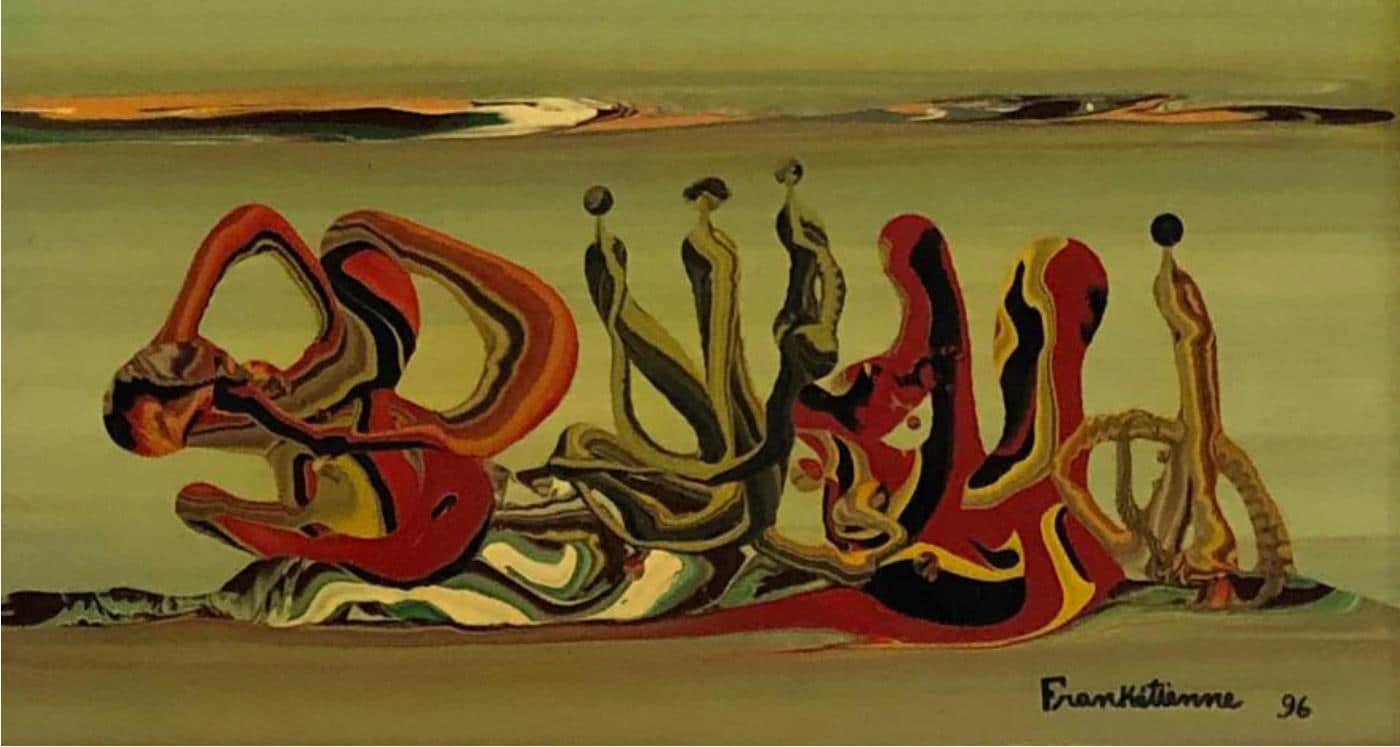
Frankétienne (Haiti), Silhouettes, 1996.
On 20 February 2025, the Haitian poet and painter Frankétienne died in Delma, Port-au-Prince, at age 88. Over the course of his life, he reflected on the fact that he was born in 1936 to a Haitian mother who was raped by a man from the United States. Frankétienne remained in his home country despite its trials, giving voice to a people desperate for a future. In his superb Fleurs d’insomnie (Insomnia Flowers, 1986), written at the end of the Duvalier nightmare, Frankétienne mused:
Dreaming is undoubtedly the first path that leads to freedom.
To dream is already to be free.
Warmly,
Vijay

